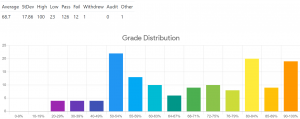A unique organic chemistry course with an emphasis on application and minimal requirement for memorization! CHEM 313 is a third year organic chemistry course that highlights different synthetic pathways in making peptides, carbohydrates, and nucleic acids.
Format of the course
The format for CHEM 313 was pretty standard for an organic chemistry course; a lecturer that goes through different reactions each class. Be aware that this course runs at 8 am, so remember to bring your coffee. Professor Sherman gives 1-3 minute joke break every class which makes waking up so early more bearable.
A recent change to the course is the allowance of a cheat sheet to midterms and finals. This sets it apart from almost every organic chemistry course at UBC – which require in-depth memorization of all the reactions and mechanisms learned. This being said, CHEM 313 evaluations focus more on approaching new problems based on mechanistic rationale that was taught in class (which also makes it a difficult course).
GPA 🙂 or 🙁
This is one of those courses where you either get the right answer or you don’t. If this is your strong suit, it is very possible to get an A+. Despite being interesting, this course will probably lower your GPA. The average for the first midterm was abysmally in the 40s (scaled up to the 60s). I took this course when COVID-19 struck. Professor Sherman, made the final exam MUCH easier than historically, and even so the class average was 71. For the more visual, here is a grade distribution from winter 2018:

CHEM 313 grade distribution. Credits: ubcgrades.com
Verdict? To take or not to take
If you’re up for a challenge, you should take this course. The topic is interesting and relevant to biochemistry majors. If you’re not really keen on organic chemistry, you should avoid this course as the midterms and finals are the only forms of evaluations and the averages are historically sub 50 prior to scaling.
